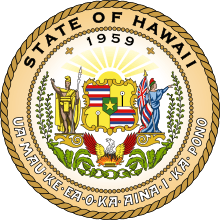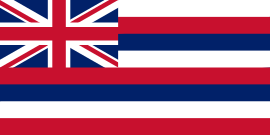Hawaii Constitutional Amendment 2
Constitutional Amendment 2 of 1998 amended the Constitution of Hawaii, granting the state legislature the power to prevent same-sex marriage from being conducted or recognized in Hawaii. Amendment 2 was the first constitutional amendment adopted in the United States that specifically targeted same-sex partnerships.[1]
| Elections in Hawaii | ||||||
|---|---|---|---|---|---|---|
 | ||||||
|
||||||
 |
|---|
| Baehr v. Lewin (1993) Baehr v. Miike (1996, 1999) Constitutional Amendment 2 (1998) House Bill 444 (2009) Senate Bill 232 (2011) Hawaii Marriage Equality Act (2013) |
| Equality Hawaii |
| LGBT rights in the United States Same-sex marriage in Hawaii Reciprocal beneficiary relationships in Hawaii LGBT history in Hawaii |
In 1993, the Hawaii State Supreme Court ruled in Baehr v. Lewin, 852 P.2d 44 (Haw. 1993), that refusing to grant marriage licenses to same-sex couples was discriminatory under that state's constitution. However, the court did not immediately order the state to begin issuing marriage licenses to same-sex couples; rather, it remanded the case to the trial court and ordered the state to justify its position. After the trial court judge rejected the state's justifications for limiting marriage to opposite-sex couples in 1996 (but stayed his ruling to allow the state to appeal to the Supreme Court again), the Hawaii State Legislature passed a proposed constitutional amendment during the 1997 session that would overrule the Supreme Court's 1993 ruling and allow the Legislature to ban same-sex marriage. This constitutional amendment appeared on the 1998 general election ballot as Constitutional Amendment 2.[2]
The question that appeared on the ballot for voters was:[3]
Shall the Constitution of the state of Hawaii be amended to specify that the Legislature shall have the power to reserve marriage to opposite-sex couples?
Amendment 2 differed from amendments that followed in other states in that it did not write a ban on same-sex marriage into the state's constitution; rather, it allowed the state legislature to enact such a ban.[4] On November 3, 1998, Hawaii voters approved the amendment by a vote of 69.2–28.6%,[5] and the state legislature exercised its power to ban same-sex marriage.[4]
The language added by the amendment reads:[6]
The legislature shall have the power to reserve marriage to opposite-sex couples.
— Article I, section 23, The Constitution of the State of Hawaii
On October 14, 2013, Hawaii Attorney General David M. Louie stated in a formal legal opinion that Amendment 2 does not prevent the state legislature from legalizing same-sex marriage,[7] which it did in November 2013 with the Hawaii Marriage Equality Act.
Results of vote
| Choice | Votes | % |
|---|---|---|
| 285,384 | 69.2 | |
| No | 117,827 | 28.6 |
| Valid votes | 403,211 | 97.8 |
| Invalid or blank votes | 9,309 | 2.2 |
| Total votes | 412,520 | 100.00 |
| Registered voters and turnout | 601,404 | 68.6 |
| Source: Hawaii Office of Elections (November 4, 1998). "1998 General Election Statewide Summary Report". Retrieved 2013-11-13. | ||
References
- Lambda Legal. "Baehr v. Miike". lambdalegal.org. Retrieved 2013-10-30.
- Wilson, Christie (January 24, 2010). "Same-sex marriage issue has endured a long fight in Hawaii". Honolulu Advertiser. Retrieved 2013-10-30.
- Gima, Craig (October 7, 1998). "Same-sex vote won't answer all questions". Honolulu Star-Bulletin. Retrieved 2013-10-30.
- Niesse, Mark (February 22, 2009). "Hawaii is latest civil unions battleground". Associated Press. Archived from the original on 2009-03-01. Retrieved 2009-03-01.
- General Election 1998, Hawaii Office of Elections, November 3, 1998, retrieved 2010-07-06
- Hawaii Legislative Reference Bureau. "Article I: Bill of Rights". The Constitution of the State of Hawaii. Retrieved 2013-10-30.
- "Haw. Atty. Gen. Op. No. 13-1" (PDF). October 14, 2013. Retrieved 2013-11-12.
.svg.png)